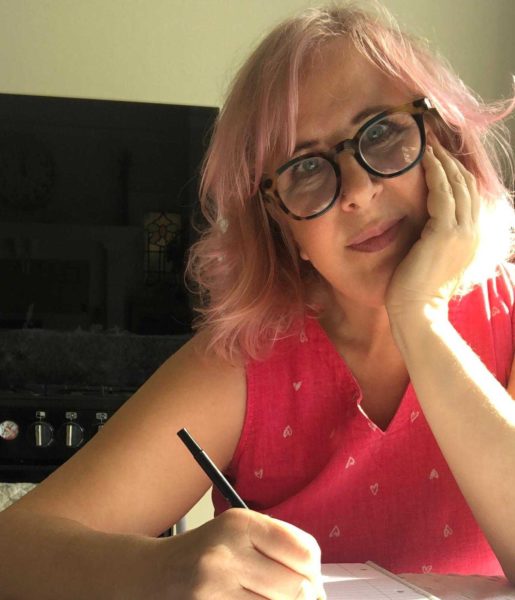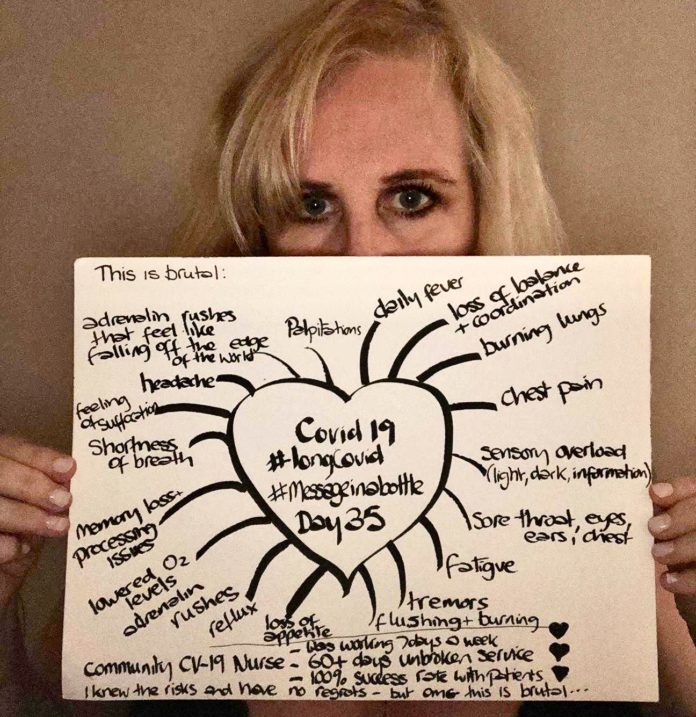The UK has administered over 17 million first doses of the vaccine. This brings us one step closer to that light at the end of the tunnel, and a chance to step back into a world where intimacy isn’t something to be afraid of, and we can once again see each other’s smiles.
The vaccine will save countless lives. But what about the people for whom in some ways the vaccine came too late. These are the people who are still suffering from Covid-19, sometimes as long as three months after they caught it.
This phenomenon has been dubbed ‘long Covid’, and the people with the affliction affectionately call each other ‘long haulers’.
The symptoms they suffer from include fatigue, shortness of breath and poor mental health. But in extreme cases they may also fall prey to organ damage that can affect the rest of their lives.
According to the BBC’s Science Focus magazine, one in ten people who catch Covid will also experience long Covid. Research shows that the virus can seriously damage the nervous system, internal organs and immune system.
…
“Many of us have gone to bed at night thinking we’re not going to wake up in the morning.”

Sandra Edwards, a founder of the support group LongCovidSOS, noticed the tell-tale signs of the virus – a sore throat, lost sense of smell and respiratory issues – so when her symptoms worsened she rushed to the hospital. “It felt like an elephant sitting on my chest,” she told me.
When she arrived, Sandra was surprised that no one tested her. “I remember asking the nurse, ‘you’re going to test me?’ and she said, ‘No, only if you are admitted’.”
Now, seven months later, Sandra is still battling the virus. “The most severe symptom that has sort of been constant has been muscle pains in my legs. My walking capacity is about ten minutes now. If I go out I have to think ahead. I think, ‘Right, OK, I need the toilet’. If there’s stairs, I actually can’t go.”
Long Covid can be so bad that sufferers lose hope. “Many of us,” said Sandra, “have gone to bed at night thinking we’re not going to wake up in the morning.”
However it hasn’t only been the physical effects that have taken their toll. “My short term memory is shot to pieces. I do not trust my brain anymore,” said Sandra, who is also worried about the future. “I think the hardest thing to accept is, could this be my life now?”
…
“I’ve got four kids and I mentally kiss them goodbye. I really thought I was not going to survive.”

Orli Summers, a nursing sister, has been unable to leave her house for five months due to long Covid. When the outbreak began she put herself at risk by helping Covid-positive patients, but said to herself, “The worst case scenario is I’ll catch it, but I’m strong and I’ll be back on my feet in a couple of weeks and be able to carry on nursing.”
However that wasn’t the case, and now the virus has taken its toll on her entire body. “It’s attacked my heart; there’s something going on with my ovaries; my thyroid; my memory and balance,” Orli told me. “There’s not a system that this virus does not infiltrate. My hair is coming out in handfuls.”
Orli described the symptoms she deals with on a daily basis. “My hands and feet will get very cold. If I feel a surge coming on, I’m burning like my lungs are on fire. My throat feels like it’s being constricted and then I get loss of cognition. I lose executive function.”
As terrifying as the physical implications are, in Orli’s experience the virus also attacks your mind. “I don’t use my cooker anymore because I can put something on to cook and in the next breath forget that I’ve done that until I can smell burning. I can’t follow conversations. I lose my words. I’ve lost my balance. I shake…. I don’t recognise myself at all.”
She hasn’t had any visitors and is now even avoiding texting people. “I was answering a few WhatsApp messages and I couldn’t understand what they were saying. I got very upset with somebody because I thought they were being not OK with me, but the next day when I looked again I realised I’d totally misunderstood what had been written and my answers made no sense. This isn’t who I am and that’s not how I want people to know me.”
Orli wishes she could work again, or even just see friends again. “I miss my life. I really miss my life.”
…
“I came down feeling like I’ve been run over by a steam train.”

Lere Fisher, who also suffers from long Covid, began by stressing how unpredictable the condition can be. At the time of our conversation he seemed fine, but he explained, “I literally thought I was dying yesterday, but yet today I look fresh – and that’s Covid. That’s what makes it so relentless.”
After self-isolating for two weeks following his diagnosis, Lere decided to go for a walk. This was when he experienced the first of his many complications. “I was gasping for breath, gasping for air, my chest felt like there was an elephant sitting on it ”, he said. “I came down feeling like I’ve been run over by a steam train.”
Lere, like Orli, felt that hospital staff sometimes did not take him seriously or believe him. On one occasion he asked, “I need to know if I’ve got any long-term damage here, because it’s really bad,” and the person he was on the phone to just laughed and said, “No, I don’t think so. You’re going to be fine”.
Lere struggles to walk and can feel delirious, which affects his ability to speak. “I went for a walk and I ended up having to stay in the café for an hour and a half because I couldn’t walk to get back home. And speaking sometimes, it is hard just knowing what that next sentence is… it’s is very scary when it happens”.
He has also begun hiding the severity of his condition from people close to him and warned that this can lead to people suffering in silence. “You don’t want to come across as being one of those people that’s always moaning,” he said.
…
“You don’t feel like your yourself.”
Kay Whitehead hasn’t been able to return to work due to the way long Covid has impacted on her physically and mentally.
But she is doing her best. “When I have good days I start to think, ‘was it really that bad? Can I really just get back to work?’ and I have tried several times to do that, to just think I’m going to do things today like a normal person. And then it just comes for you again.”
She has similar symptoms to other long haulers. “I’ve had muscle pains throughout. I also still have a cough nearly every day,” she told me. And although it feels as if water will help, it doesn’t. “It didn’t stop me coughing and it seems like I never got back to not coughing.”
But it is what she describes as ‘brain fog’ that has impacted her the most. “It’s like my brain’s not actually switched on,” she said. “I usually think of myself as quite a sharp person, but when you don’t have the words coming to you or I’ve used the wrong words at times, it really gets to you. You don’t feel like your yourself.”
…
Sandra helped set up LongCovidSOS to campaign for what she described as the three Rs: recognition, research and rehabilitation.
The group has made one huge step towards accomplishing their goal last summer when around 60 long-haulers had a meeting with officials from the World Health Organisation in what Buzzfeed described as “the biggest recognition yet” of the condition.
However, there is still a long way to go before people suffering with long Covid can feel able to join in fully with a post-vaccine world.
If you or a loved one need support with long Covid you can sign up on the group website here: https://www.longcovidsos.org/
Other suggestions for help appear on the site’s support page: https://www.longcovidsos.org/get-support
And for details of clinics in the East London region for long term sufferers, go to this link: https://www.guardian-series.co.uk/news/18953960.long-covid-sufferers-can-get-support-east-london-essex/

